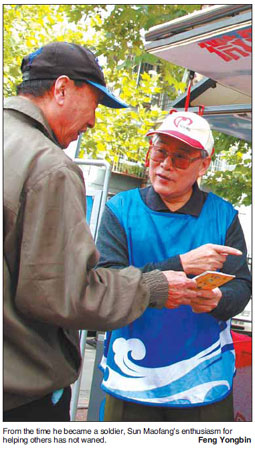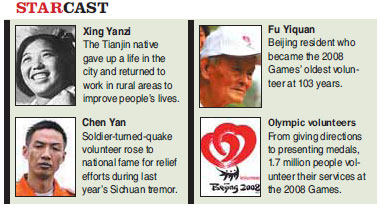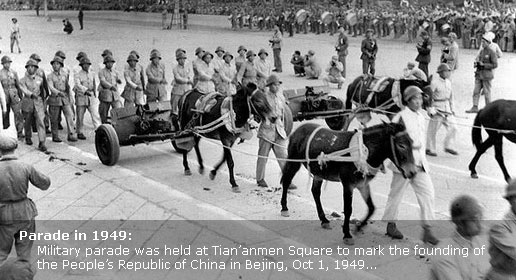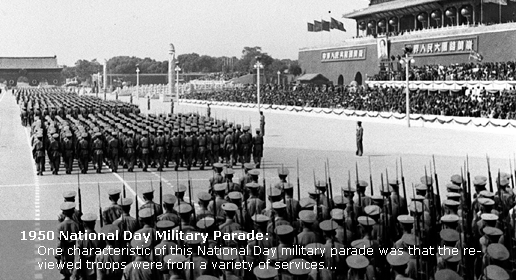60 People, 60 Stories
Helping hand
By Cui Xiaohuo (China Daily)
Updated: 2009-09-30 09:56

There is one considerable distinction between 66-year-old volunteer Sun Maofang and his role model, legendary soldier and cultural icon Lei Feng.
Lei, immortalized in propaganda posters for his exemplary volunteerism and dedication to helping others during the early 1960s, never left his name with people he helped. Sun, on the other hand, can be seen giving away his business cards to those he assists whenever he can.
Sun, who became a soldier at the age of 22, the same age that Lei reportedly died, laughs at the comparison.
"Lei Feng was humble," says the gray-haired man, decked in his volunteer T-shirt, cap and favorite army green trousers. "His humbleness represents the selflessness and modesty of the Chinese way of living. He had such a beautiful mind. I am less noble than Lei Feng. I have just been spreading his message."
In March, the veteran soldier was voted atop a field of the Ten Best Beijing Volunteers in 2008, the city's highest award for a volunteer through the Beijing Volunteers Federation. In a rare moment at the award ceremony, Sun exchanged a warm soldier's salute with Liu Qi, Beijing's municipal Party chief and president of the Organizing Committee of the Beijing Olympics.
Today, there are over 10 million volunteers in China and nearly 100 million have taken part in a volunteer program at some point this year. Volunteerism has also expanded from helping others mired in poverty relief and suffering from diseases to performing acts beneficial to the environment and the climate.
| ||||
"I always enjoy it when elder ladies call me 'son,' when younger fellows address me as 'grandpa' and my peers greet me as 'brother.' I am simply content when I reach them. I have been feeling this way all these years," he says.

Sun says he once helped some rural villagers with their farming during his spare time as a soldier stationed in Beijing. As he toiled with them on the farms, he would befriend them and talked about their tremendous efforts to provide for themselves on a daily basis.
As a junior army officer in the 1980s, Sun moved to urban Beijing. It was there that he began focusing on his neighbors in need, assisting them when they needed it. To this day, he remains close friends with many of them.
"We are not just doing somebody a favor. We are making friends. Maybe someday in the future, they may become one of us," Sun recently told a group of students who regularly assist him at a volunteer service station in downtown Beijing named after Sun.
Sun visits schools frequently and recruits volunteers as young as 8-year-old second-graders in his various ventures, which include offering free and basic medical services.
The recent spirit of volunteerism, says Ren Hai, an expert on the Olympics at Beijing Sports University, was "greatly lifted with the success of the Beijing Olympic volunteer program last summer." Still, he says that more is needed than simply enthusiasm to become a volunteer,
"The volunteer programs in China will not last if it just subsists on passion. The good experience (from the Olympics) has to be sustained and written into the rules of future volunteer programs."
Sun also admitted that one of the major obstacles that stymies volunteerism in China is the social environment.
Days when everyone was as nice as Lei Feng in the '60s are gone, Sun says. But the social atmosphere has been replaced by a more open society with more volunteer groups willing to contribute to the social well-being, he adds.
Sun believes someday there will be less incidences in which he is challenged by questions such as: "Why do you still make a show out of yourself at such an age?"
"People will stop thinking in this way once they know what volunteers try to achieve," says Sun, who will celebrate his birthday during the National Day Holiday.
Time Line
1955-1960s
2.88 million elementary and secondary school graduates, the first batch of zhiqing, or educated youths, voluntarily return to help their native lands in the countryside upon Chairman Mao Zedong's call.
1963
The "Learn from Comrade Lei Feng" campaign is initiated by Mao to call on the nation's youths to follow the young, devoted soldier's example in the wake of natural disasters and failed political campaigns.
1966-1980
18 urban youths sign up to go to the countryside in another wave of the zhiqing movement, the focus of which is to "reeducated by the poor and low-middle peasants".
1970s
Lei's prominence in textbooks reaches a climax. "Living Lei Feng" becomes a term for anyone seen as selfless, or anyone who goes out of their way to help others.
1980s
The first international volunteer group from the UN visits China. The first community volunteer groups are set up in Tianjin.
1994
China's first volunteer group, Chinese Young Volunteers Association, is founded. Cities nationwide follow suit shortly. Volunteers take the stage in numerous international events held in China.
After 2000
"Volunteers" becomes a popular word. In 2008, a record number of volunteers nationwide take parts in the Olympic and Paralympic volunteer program.








